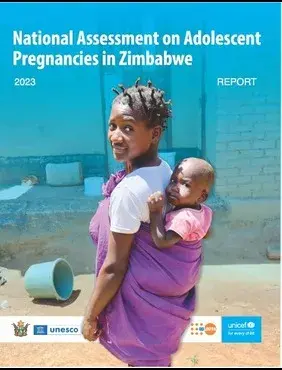This report highlights key findings from the national assessment of adolescent pregnancy in Zimbabwe. The study was conducted to determine the prevalence of adolescent pregnancy in Zimbabwe and to identify root causes leading to adolescent pregnancy particularly in the wake of COVID-19. One of the objectives of the study was
to develop detailed profiles of a cohort of adolescents who experienced pregnancy before the age of 20, to provide a deeper understanding of their experiences and needs and map the much-needed support to tackle adolescent pregnancy and support adolescents who fall pregnant.
Methodology
The national assessment used both primary and secondary data analysis. Primary data used a mixed method cross sectional survey conducted among 1,418 adolescent girls aged 10-19 years in 6 out of the 10 provinces in Zimbabwe. Six provinces were purposively selected to include four provinces with the highest adolescent birth rate (ABR) in Zimbabwe, and two provinces with the lowest ABR. Catchment (CAs) and Enumeration Areas (EAs) were randomly selected. Adolescent girls completed an interviewer administered structured interview. Focus group discussion (FGDs), indepth interviews and key informant interviews were also conducted with adolescents, parents and key stakeholders. Quantitative data was analyzed using Stata 17.0 and qualitative data was analyzed using thematic and constant comparison analytical approaches.
Secondary data analysis included literature review and analysis of 8 Antenatal care (ANC), maternal and infant HIV care indicators from the Ministry of Health and Child Care’s District Health Information System (DHIS-2) from January 2019 to December
2022. The study was approved by the three relevant line ministries and ethical clearance was granted by the Medical Research Council of Zimbabwe (MRCZ/A/2932). Participants provided written informed consent.


